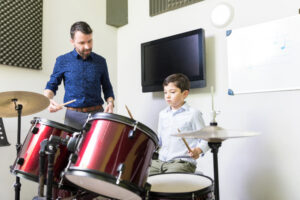As private music teachers who work with beginner students every day, we’re often asked, “What’s the best age to start drum lessons?” While some kids are eager to pick up sticks by age 3, others hit their stride around 7 or 8. In short—there’s no perfect age, but there are signs your child may be ready.
Drum lessons are all about rhythm, coordination, and controlled energy—skills that can benefit kids at any age with the right approach and support.
Ideal Age Range for Drum Lessons
Here’s what we’ve found based on our experience teaching private lessons at home:
- Ages 4–6: These kids can benefit from informal rhythm games, hand percussion, and exploring beat-making. A full drum set might be overwhelming, but they can build a strong foundation.
- Ages 6–9: This is often the sweet spot for structured drum lessons. Kids have developed enough motor skills and attention span to start learning basic technique, rhythm reading, and coordination.
- Ages 10+: Older students are typically ready to dive into full drum kits, advanced patterns, and even band or ensemble playing.
What to Look For in Readiness
If you’re wondering whether your child is ready to start drum lessons, here are a few signs:
- They tap rhythms constantly or show an interest in drums.
- They can focus on a task for at least 15 minutes.
- They can follow multi-step instructions.
Still unsure? This PBS article on musical development breaks down how music fits into each stage of childhood growth.
Internal Tip: Make Learning Fun
We often blend lessons with games, challenges, and favorite songs. In fact, many of the strategies we use with drum students overlap with our tips for making music practice fun and productive.
FAQ: Best Age to Start Drum Lessons
Can my 5-year-old start on a drum set?
Yes, with a kid-sized set and a teacher who specializes in young beginners, it can work well.
What kind of drums should a child start on?
We usually begin with a practice pad or snare before moving to a full kit—acoustic or electric depending on space and volume needs.
Do they need to read music to start?
Not at all. Reading rhythms comes naturally with time—we focus on listening, movement, and feel at first.
